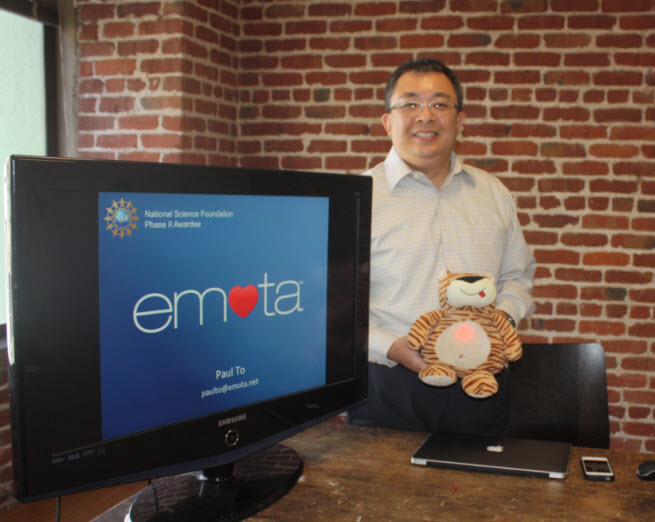Paul To felt like a guilty son a few years ago. His father got sick, and so did his grandmother. But he was far away and couldn’t offer support.
So the former venture program manager for Nortel thought about the problem and eventually founded Emota, a startup that allows people to offer loved ones emotional support from long distance. Emota has created sensors full of “ambient intelligence.” They can sense when someone is near. To embeded these modules in teddy bears. So when a person hugs a bear, its impact can be felt far away.
The teddy bear transmits a signal over the Internet to another teddy bear, which lights up. So when you hug a bear, your loved one knows it. They can hug back, and the response gets sent over the Internet. It’s a simple idea, but it can pack an emotional punch,” To told GamesBeat.
 He started Emota in 2010. Within a couple of months, he received a grant from the National Science Foundation to study the field of ambient intelligence, where sensors detect things and report them to a computer for processing. The technology wasn’t easy because it involved combining the physical world with the virtual. To’s San Francisco startup recently went through the YetiZen game startup accelerator.
He started Emota in 2010. Within a couple of months, he received a grant from the National Science Foundation to study the field of ambient intelligence, where sensors detect things and report them to a computer for processing. The technology wasn’t easy because it involved combining the physical world with the virtual. To’s San Francisco startup recently went through the YetiZen game startup accelerator.
“The ambient intelligence is really cutting-edge stuff,” said Japeth Dillman, co-founder of YetiZen.
At first, To wanted to find a way for people to offer comfort to older parents or sick loved ones. That may still be possible, but To pivoted to what could be a larger market: grandparents who want to keep in touch with their grandchildren. Statistics show there are about 70 million of them in the U.S., and they spend $23 billion a year on grandchildren. But 43 percent of them live far away, and they want to be better connected. Skype video calls and email work, but grandparents often aren’t that technical.
“They are conscious about being a bother or being a pest,” To said. “They don’t have to call every day, but we give them a way to create awareness of someone else.”
So he thought of the teddy bears, since, deep down, we all need a hug. One of the ideas came from a “presence lamp” created by MIT and Xerox Labs several years ago which connected to the Internet. When you sat near it, the lamp’s motion sensor detected your presence and sent a signal over the Internet to your loved one’s lamp, which then glowed.
The teddy bear is loaded with about $7 worth of electronics. It includes a proximity sensor, speaker, and Bluetooth radio. Future models could include GSM cellular connectivity. It has an accelerometer, so when a child plays with it, the bear can sense the motion. For now, all the bear does is light up when someone is near. But future versions could read a child a bedtime story that the grandparent records and sends from afar. All of those electronics make the toy more interactive.
To believes the concept could be extended to separated lovers as well, so he could embed the module in other kinds of keepsakes such as jewelry.
To has a small team of a handful of people and is working with contract manufacturers. He has started 15 companies in the past and served as product strategist for Riverstone, which went public in 2001. His advisors include Guitar Hero co-creator Kai Huang, Ted Selker of MIT, and Eric Chan of Embee Mobile. Other seasoned members of the team include Cyprien Noel, Harlan Iverson, Charissa Klassen, and Laura Kassovic.
The company has raised two rounds of funding totaling $650,000 from the National Science Foundation. That enabled the company to move to its Alpha testing product. Emota is expecting to close a $450,000 round shortly and, another round of fundraising will begin soon in the U.S. The company is targeting getting its first teddy bear to the market by the holidays.
“We’re targeting happiness and positive emotion,” To said.rGlbNqASBTU?hd=1
VentureBeat's mission is to be a digital town square for technical decision-makers to gain knowledge about transformative enterprise technology and transact. Learn More

